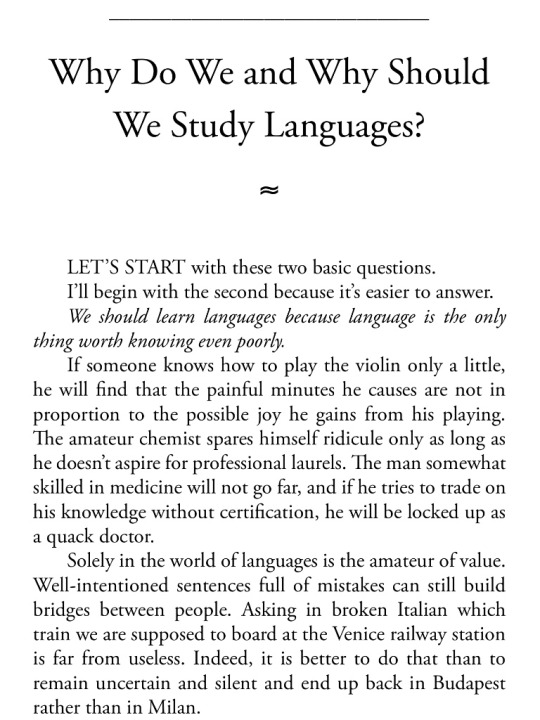Text
youtube channels to motivate you this semester
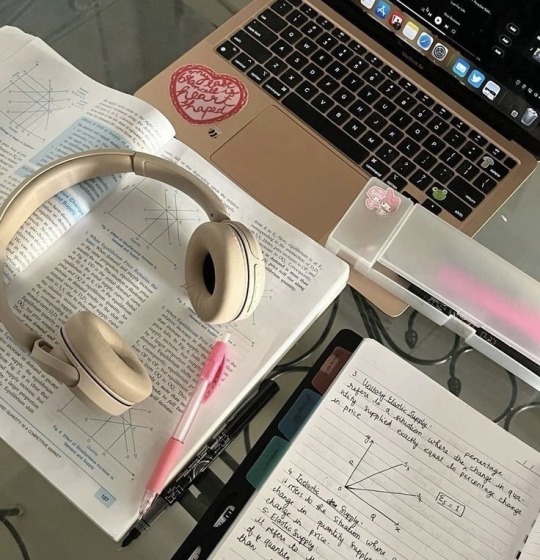

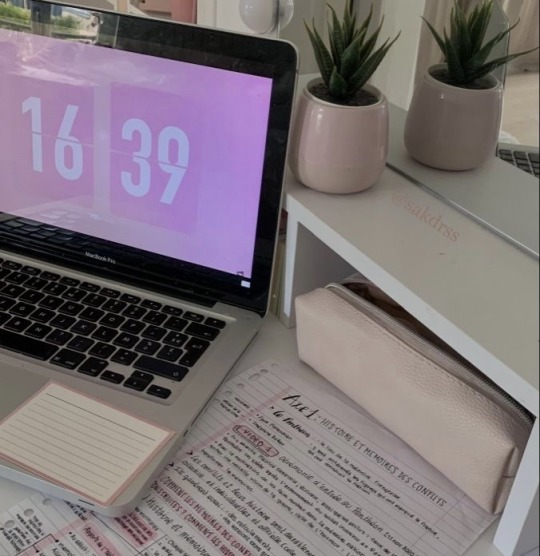
♡ abao in tokyo - study with me’s & playlists
♡ advika singh - study & productivity vlogs
♡ allie c. - medical school vlogs
♡ carrot td - study with me’s
♡ celine - study with me’s
♡ deaana - medical school, study with me’s, stationary, etc.
♡ dear mimi - study vlogs
♡ dia - medical student vlogs
♡ dr. rachel southard, do - medical school & residency vlogs & talks
♡ emily feng - medical school vlogs
♡ emilystudying - dental school & study vlogs
♡ emma grace - nursing school vlogs
♡ emmalilyn - study with me’s
♡ ginny - study vlogs
♡ hyobin - medical student vlogs
♡ leighton sanders - nursing vlogs
♡ lucky penny - study with me’s
♡ lunardazes. - uni study vlogs
♡ madi’s nursing journey - nursing school & nursing vlogs
♡ mango oatmilk - study with me’s
♡ maria silva - study & hospital interning vlogs
♡ merve - study with me’s
♡ mishujo - study & productive vlogs
♡ nada - study & productivity vlogs
♡ ray hon - study with me’s
♡ sab yang - medical school & study vlogs
♡ sean study - study with me’s
♡ sierra lyn - nursing vlogs
♡ studymd - study with me’s
♡ study to success - stationary, study with me’s, study hacks, etc.
♡ tani study - study with me’s
♡ yours truly, chloe - study vlogs
♡ yulma - study with me’s
11K notes
·
View notes
Text
study motivation and tips: getting a 4.0 gpa with a computer science degree
How I Got A 4.0
I posted this in r/college, but since Computer Science was one of my majors, I figured you guys might like it too. Hopefully you learn something useful. CS is a hard major, but a 4.0 is definitely doable. Good luck with compilers though. Ouch.
I graduated last May with a 4.0 in Computer Science and wanted to share how I did it with you all. I really believe that these tips will help pretty much everyone get better grades. Yes, it takes some work and planning, but it’s so worth it. :)
Go. To. Class.
Pay. Attention.
I’m sure you’ve heard it 1000 times, so I won’t dwell on it. Just know that if I had to shorten this post down to five words, those would be the words. Go to class, and while you’re there, PAY ATTENTION. Showing up and paying attention in class is the best use of your time while you’re in school.
Start assignments early. Yes, even semester long assignments. In fact, I’d often break down large projects into smaller parts and give myself deadlines for each part so that I kept moving forward and didn’t just put the whole thing off until the day before it’s due.
There are several advantages to starting your assignments the day that they’re assigned. The first is that you give yourself time to go to office hours if you have questions about the assignment. Your professors are there to help. Go ask them questions. Hell, just go talk about life. Your professors will give you tons of help if you show up and ask for it, plus they're probably pretty cool people.
Starting early also gives your brain time to mull over the problem before actually solving it. Often, “starting early” merely meant that I’d read over the homework problems or the requirements for the paper and then let them float around in my brain for a day or two before starting to brainstorm or writing a single line of code. Your brain does a lot of thinking while you’re off doing other things, and will often come up with great ideas in your absence if you just give it time.
Starting early allows you time to make mistakes and gives you a bit of breathing room in case something else comes up. By staying a few days ahead on my work, if I didn’t do anything for a day because I was sick or something else came up, I didn’t fall behind on my assignments. It’s much easier to stay ahead than it is to get ahead. Start the semester off strong and stay on top of your work so that you build up a bit of a buffer for when things do go wrong. Because things will go wrong.
If you start early, you’re also likely to finish early, which gives you time to fix things before turning in your work. Reviewing your work before turning it in is important. I can’t tell you how many times I’ve caught stupid errors on exams by going through and double or triple checking my work before turning it in. The same thing happens with homework. Aim to finish early so that you have time to step back for a bit and give your brain a break, then revisit your work to check it over for errors.
Study for exams early as well. I typically would start studying about a week before the exam, but if I could manage it, two weeks was even better. I’m sure you’re aware that cramming isn’t going to be nearly as effective as spreading out your studying, so I won’t spend too long on the topic. Suffice it to say that twenty to thirty minutes of studying each day for a week or two leading up to an exam will often be enough to get a grade that your mom would be proud to hang on her fridge.
Make flashcards. Pretty much the easiest way to fit in little bits of studying is to make a set of flashcards that cover the exam material and carry them around with you. Any time you find yourself with a few extra minutes while you wait for someone to show up, or class or a meeting to start, pull out the flashcards. Before you know it, you’ll fit an extra fifteen or twenty minutes of studying into each day without having to plan it, and that time would’ve otherwise likely been wasted on your phone.
Use the weird little chunks of time. Our days are full of little two to ten minute chunks of empty space. Use them! They’re great for doing a bit of brainstorming for a paper, reading, writing, or studying. When you have a lot to do, it’s important to use your time efficiently.
Learn to manage your time. I perfected my ability to manage my time about half way through college and I would not have achieved everything I did without it. Getting good grades, working, having a social life, taking care of yourself, sleeping enough, and participating in clubs and groups on campus means you’ll be busy. To get everything done, your time management needs to be almost impeccable.
Personally, my strategy for managing my time was calendar blocking. Each evening, I planned out exactly what I needed to do the next day from the time I woke up til the time I fell asleep, and then I stuck to that schedule like my life depended on it. Efficiently managing your time means that everything gets put on the calendar in a way that makes sense, then you follow the calendar, and not a minute is wasted. Use those little bits of time!
Take advantage of office hours. Office hours are there to help you! Often, the professor will be able to explain something in a slightly different way than they did in class, or help you to make a connection that just wasn’t clicking before if they have the chance to talk to you in person. Sometimes they’ll even just give you the answers to the homework. I’ve seen it happen. Plus, showing up to office hours throughout the semester and not just at the end shows your professor that you care and want to do your best, so they’re more likely to be lenient while grading your work and give you extensions if you need them.
Work with your peers. Find a few people in each of your classes that you can work with. Help each other with homework, studying, and understanding concepts that you don’t fully grasp. I couldn’t have done it alone.
Working with others is beneficial in a couple ways. If you don’t understand something and ask a classmate to explain it, they may have insights that you didn’t see, or share tricks that they use to help remember things. The people around you are full of great information. On the other hand, if someone else doesn’t understand a concept and you explain it to them, you’ll further solidify your understanding of the idea and be better able to remember it. Teaching others is one of the best ways to check your own understanding of something.
Care about your classes. I did everything I could to take classes I loved with professors I love in subjects that I love. It’s a bazillion times easier to learn new ideas and work on difficult assignments if you deeply love the work you’re doing. I formed close friendships with a few professors and genuinely loved both of my majors. Waking up each morning excited to work and learn makes it significantly easier to get good grades and really dedicate yourself to learning.
Stay organized. This is fairly basic advice, but it’s necessary to succeed. Know where all of your books and assignments are. Keep your files organized on your computer so you can find and reference old assignments if you know they have useful information. Don’t load your bag up with crap so that you can’t find that paper you need to turn in. Color coding my notebooks and folders by class helped me to find things easily and put them back in the right place when I was finished with them. You don’t need to be flawlessly organized, but make sure that you have a system that works for you. Don't overthink it either. Keep it simple.
GET ENOUGH SLEEP. You won’t be able to function at your best, retain the most information, or do your best work if you’re tired. I never pulled an all nighter in order to get work done. I never even came close to pulling an all nighter. I rarely did homework after 7 p.m. Get your work done at a reasonable hour, and then get some sleep.
Sleep works wonders when it comes to your brain’s ability to hold and process information. All of your assignments and test scores will improve if you start getting enough sleep. You’ll be able to work faster and more efficiently and have more time for yourself if you’re well rested. Getting enough sleep as often as possible was priority number one for me. There will be occasional days where a full eight hours isn’t possible, but nine days out of ten, you need to be getting at least seven hours of sleep.
Something that really helped me personally, but may not help everyone, was to become a morning person. Setting myself up with a good morning routine so I could get a lot of homework done before the rest of the campus woke up gave me the ability to be a bit more flexible with the rest of my day.
I know you don’t want to hear it, but getting up early and getting shit done is going to be way better for your grades than staying out late partying. It’s also better for your overall health and happiness. It took me until sophomore year to figure that out, but once I stopped going out all the time, my life improved dramatically.
Finally, go above and beyond. If you really love a subject, or a project, or a class, run with that. Professors teach because they’re passionate about their subject. They love seeing that passion in their students and will make your life so much easier if they know you’re genuinely interested in the subject. Don’t force yourself to pretend to love something you couldn’t care less about, but if you find something you love, don’t hide it.
0 notes
Text
800 free Computer Science classes | Comp-Sci Resources ♥
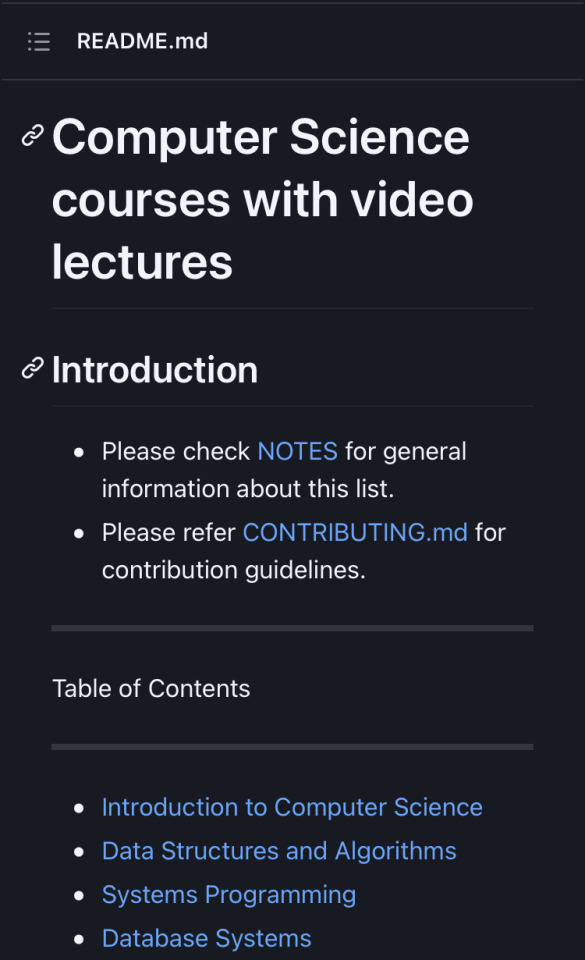
800 free Computer Science classes you could take online right with video lectures!
Link: GitHub - Developer-Y/cs-video-courses: List of Computer Science courses with video lectures
I found this link in a tweet and found the site very helpful! Take full advantage comp sci learners!!!
Have a nice day and happy programming ♥
2K notes
·
View notes
Text
if you ever feel like you're not "smart enough" for STEM or didn't do that great in school, i just wanna let you know that i failed algebra 2 THREE TIMES and dropped my high school physics class the FIRST WEEK...
and NASA chose me to student research with them.
so what i'm trying to say is that STEM is for EVERYONE. if school wasn't the easiest for you and you're not the strongest in math, don't let that stop you from pursuing STEM. working hard for goals makes you a great scientist.
screw that stereotype that all STEM majors are geniuses who were building robots and knew how to work a microscope at 3 years old.
STEM IS FOR EVERYONE! BECOME A FREAKING SCIENTIST! YOU CAN DO IT!
6K notes
·
View notes
Note
Hello! for the longest time I've thought that I'm just "not good" at math, and that I'm just a creative type or something, but for the past few years I've been trying to brute-force my way through math drills and stuff to improve because I want to go into a STEM field. I've found that it doesn't work. I have, however, gained a kind of Stockholm syndrome for math, and I find myself wanting to know *more*. I feel like I'm missing out on something way beyond myself but idk where to even find that. So here i am. Asking a blog on tumblr for the secret math knowledge. If you have any resources that i could read about math that isn't just "here's how to do this" i would really appreciate it!!!
First of all, complete props to you for giving something that doesn't initially appeal to you, in this case, maths, a chance. Mathematics can be frustrating and even annoying, being an oftentimes nit-picky field. You can quickly realize that these are also the traits that grant the satisfaction and euphoria of mathematics. So don't forget to be proud of yourself for not disregarding mathematics as a whole and actually giving it a go.
Second of all, creativity is very necessary for maths. It is a shame that the educational system doesn't do maths justice (A Mathematician's Lament by Paul Lockhart is exactly about this). Mathematics is presented as something mechanical, force-feeding formulas and having students repeat them to find adequate results. That is not a fair portrayal of mathematics.
Different people will have different conceptions of what the learning of mathematics is or should be - I mean, for god's sake, mathematics hasn't even been defined properly and one expects people to know what to do with it. I can only tell you what I conceptualize mathematics, and its learning, to be. For me, mathematics is the boring work of examining multiple results and cases of the same formulas, it is the finding of patterns and attempting generalizations, it's the excited scribbles of formulas and the necessity of looking at a particular scenario from multiple perspectives. Most likely, the generalizations won't come easily, a minus sign will be forgotten making the following calculations obsolete, an approach to a problem will prove fruitless, and laborious work will be done only to find out there was a specific theorem that would have shortened the whole process. Patience is required for maths, and hopefully, you can now see that creativity is too, there is no shortcut to knowing where to look or what technique to utilize. As is the case with most worthwhile pursuits, and as you know from experience, mathematics is endlessly frustrating, but that also means it is endlessly fun.
Now, I do not have any secret math knowledge (or do I), what I can do is present you with some things that fascinate me and have led me to love mathematics as much as I do, outside of the conventional mathematics curriculum.
Maths really comes down to practice, practice, practice... as many other things. I heavily encourage you to start playing around with mathematics a little bit. Olympiad mathematics kind of do that, (I, very conveniently, have a lot of posts about that.) as do many other math competitions. Maybe try out some exercises from your national olympiad and, with no judgment, because this is just to have fun, play around a bit. Disregarding the conventional maths you know, test out your logic, laugh at mistakes and losses of time, and feel that happy rush when a conjecture you reach, or part of it, is correct.
In terms of the resources, I opted for a mix of funny math history moments and some actual mathematics, in no particular order. Prepare for confusion. ↓
0. How Mathematics is enjoyable
No better way to start than with the reasons mathematicians decided to dedicate a good portion of their lives to the subject, or why some people just enjoy mathematics. This is something that greatly interests me, I always love to see people’s passion for their interests, hence this post, where you’ll find many people’s reasons for enjoying mathematics.
Andrew Wiles answers “What does it feel like to do maths?” - (video) - Andrew Wiles is a mathematician who proved the theorem which had been taunting mathematicians for centuries, famously known for being the subject of the third point of this same post, explains peoples’ distaste for maths and his own experience with the subject.
YouTube Stories: Learning Mathematics with Wootube by Eddie Woo - (video) - Eddie Woo is a wonderful mathematics educator as well, who videotapes his lessons (available on Youtube). This serves as an introduction to him and his channel.
Mathematics is the sense you never knew you had by Eddie Woo - (video) - In his TEDx Talk, Eddie starts by explaining his distaste for maths in his school years, mentioning his low scores and lack of interest, and how, despite this, he ended up as a maths teacher.
Reddit asks: “Why do you love maths?” - Another compilation of people’s explanations for their mathematical interest. Wholesome content ahead.
-
1. Intro to a new perspective on mathematics
Taming, claiming and reframing the beast that is mathematics by Vinay Kathotia - Small article related to the portrayal of mathematics by most and by mathematicians themselves.
On proof and progress in mathematics by William P. Thurston - Mentioned in the previous article, 17-page
Anyone Can Be a Math Person Once They Know the Best Learning Techniques by Po-Shen Loh - (video)
-
√2 . The Pythagorean Cult
I’m sure you’re aware of Pythagoras and his fetish for right triangles, but do you know about his weird cult? That’s right, Pythagoras was the founder of Pythagoreanism, a cult based on the teachings and beliefs held by him and his followers, the Pythagoreans. - very original naming ik.
Here’s and article about them. A really popular myth related them is the throwing of Hippasus into the sea as a punishment for “believing” (i guess) in irrational numbers.
The unreasonable man by Vinay Kathotia, further explores the irrationality of the square root of 2, allegedly identified by Hippasus, providing some proofs of it.
Proof: √2 is irrational by Khan Academy (video) - Because Khan Academy rarely misses.
The Madness of Pythagoras by Kayla Mahoney - Did you know Pythagoras refused to eat fava beams, because he claimed they contained the souls of the dead? Now you do, and there’s no going back >:).
-
2. The base tools of mathematics
Introduction to Mathematical Thinking by Alexandru Buium - Pretty self-explanatory title, simplistic and general apprach to mathematics starting with the essential, logic.
The Five-fold Path to Mathematical Wisdom by Vinay Kathotia - Article about five different approaches to mathematical problems/representations.
How to think like a Mathematician by Kevin Houston - Really useful book, starts with certain study skills and develops to the logic involved in mathematical thinking, explains theorems, definitions and proofs! Highly reccomend.
How to Think Like a Mathematician by Eugenia Cheng - (video)
-
3. "I have a truly marvelous demonstration of this proposition that this margin is too narrow to contain."
Yup, this is about Fermat’s Last Theorem, which took 350 years to be proven.
I’m guessing you’ve come across some jokes about it, how could one not. Essentially, in the 1630′s, our man Pierre de Fermat jotted down the conjecture (fight me, no proof no theorem) that states that no three positive integers a, b, and c satisfy the equation a^n + b^n = c^n for any integer value of n greater than 2, along with the sentence "I have a truly marvelous demonstration of this proposition that this margin is too narrow to contain.". The paper which contained this was only found after his death, and, as far as we know, he never got around to actually writing the proof. Because of this, we call this statement Fermat’s Last Theorem.
Andrew Wiles was who ended up proving Fermat’s Last Theorem, in 1993, after six years of working secretly on the problem. (Imagine your dirty little secret being working on revolutionizing an entire field of study, what a guy honestly.)
Fermat's Last Theorem - The Theorem and Its Proof: An Exploration of Issues and Ideas [1993] - Documentary about the theorem and its proof, as told by Andrew Wiles himself.
-
4. Functions
Honestly functions are just a very needed side of mathematics that can be applied to pretty much everything. You’ll find them in your average mathematics curriculum and in your everyday life, if you know where to look.
Introduction to functions
Introduction to Mathematical Reasoning - Numbers, Sets and Functions by Peter J. Eccles
Functions in the Real World - Education World
- This is definitely a more theoretical part of the list, I am sure you’ve encountered functions before and the resources you have musn’t be terrible. Look into these if you find the necessity, but again the “math secret” really is practice. They can be interesting reads though.
-
5. Möbius strips and Klein bottles
The wondrous world of ✨one-sided objects✨. Learn about these cool looking objects and the field they originated, topology.
The Mathematical Madness of Möbius Strips and Other One-Sided Objects by David Gunderman and Richard Gunderman
Intro to Topology by Alex Küronya - Decently advanced maths, I don’t know what level of maths you’re learning, but honestly only read this if you have a pretty thorough backgroung in maths and you’re enrolled/very interested in the field.
Möbius Strip - Cool graphics, cooler maths.
Klein Bottles on Numberphile - Because Numberphile never misses.
-
6. The Chicken McNugget Theorem
Yes, you did read that right, No, this is by far not the only theorem with a weirdly funny name*. This theorem derives from a 1800′s math problem.
Explanation of the theorem by Xavier Lien
Chicken McNugget Theorem - Art of Problem Solving
Another explanation, if needed by Mike Beneschan
*Proof: Reddit asks: “ What's the funniest theorem name you know? ” - Literally a gold mine, read this.
-
7. Godël’s incompleteness
One of the essential works of Modern Logic. His theorems destroyed the search for a mathematical theory of everything, at the mere age of 25.
Gödel’s Incompleteness Theorems - Stanford Encyclopedia of Philosophy
The paradox at the heart of mathematics: Gödel's Incompleteness Theorem by Marcus du Sautoy @ Ted-Ed (video)
How Gödel’s Proof Works - Quanta Magazine
Gödel: His Tragic Life Story by Aimee Lamoureux - (TW: Sensitive themes)
-
8. Mathematics is an art, actually
I’ve seen many people stray away from the sciences because they’re “creatives” or “arts people”. Hopefully you’ve gotten at least a glimpse of the creativity needed in mathematics - if you didn’t, that is totally on me and I’m sorry.
I don’t doubt that you may be a “creative type”. We actually need creatives, more than anything, in this field. I thought the perspective of mathematics as an art mignt be a good ending note.
Why Math is an Art, Not a Science by Peter Flom
Why the history of maths is also the history of art by Alex Bellos - He also wrote the book “Alex’s Adventures in Numberland”, which I own and have read. It’s a pretty sweet book, it has my stamp of approval if you’re interested.
Math and Movies (Animation at Pixar) - Numberphile - On the mathematics behind the art of animation.
Art and Math: Aesthetics of Calculations by Rute Ferreira (DailyArt Magazine)
-
Besides this I’m also leaving a list of youtubers/authors that are worth looking into. :)
∞. General resources:
Math-related Youtube:
Numberphile - Have different concepts explained to you in a seemingly personal and almost always funny manner.
3Blue1Brown - Maths explanations paired with excellent visual representation of the concepts.
Reducible - As they put it “Reducing problems to their simplest form.”. Also paired with really good animations.
Websites:
Art of Problem Solving
Blogs/Articles:
Cantor’s Paradise - I’ve linked a few articles published there throghout this post. Essentially, different authors publish math articles in this online space, varied and generally well-written about topics.
Alex Bellos for The Guardian - Puzzles and mathematical articles.
Mathblr Blogs - Check the notes of this post to find a lot of them.
Games:
Nerdle - Math Wordle
(...) - Please reccomend more resources below, I’m not the most well-versed on these subjects.
-------
Hopefully, you now find maths a little sweeter, funnier, or comprehensible. As with most things, people lead math discovery, and there’s absolutely no reason you’d be unable to be part of that group.
Mathematical problem-solving is something really frustrating but also immensely fun and rewarding. Please look into it, be it olympiads or general problems you find online, don’t take yourself too seriously and have fun with maths! Mathematics doesn’t judge, people do. I wish you well on your math journey! Hopefully, you’ll love it.
P.S: Feel free to add to this post with any math stuff you think is interesting. The more, the merrier!
189 notes
·
View notes
Text
Discipline always wins over motivation. There are days where you’re not motivated but that’s where your discipline will carry you over. Motivation is a feeling, it comes and goes. But discipline is a skill you build.
1K notes
·
View notes
Note
I'm not sure if someone has asked you this yet, but how do you learn a new language? I really want to learn other languages im just stuck on where to start. Do you use apps or buy books on grammar and all that jazz😂? Im interested to know how you do it. Thank you!! 😊😊
The majority of languages that I study I study them in school, so for me it’s about being forced if i want to pass the year, but I study some languages such as Chinese, Spanish and Ancient Greek on my own.
What I usually say is that following some extra lessons out of school (even if they’re never free) is always the best option to learn a language, but I’ll list you down some tips if you’re interested in learning by yourself.
- Start with videos.
It may actually seem weird, but the best way for learning is for you to like what you’re going to study. Watch videos in the language you want to learn, watch web-dramas, music videos or shows with subtitles in your language, you’ll see that the most used words will remain in your mind.
For example, before starting to study Chinese, I watched the whole first season of with english subtitles and words such as 我 (I), 么 (what), 这 (this), 天 (Heaven/God, I’m still not sure) are stuck in my mind and easily for me to recognise.
- Buy grammar books.
Something that it’s unusual among people who decide to self-tutor and learn a new language without courses, is buying grammar books. I still don’t understand why people don’t do it, but grammar books are godsend gifts. They may seem boring and some of them (such as my english one) are enormous, but they are the best way to learn something new.
In a grammar book you’ll mostly find anything you need to survive, also, if you never touched the language, start buying the little grammar books for elementary kids, I know it may seem weird and embarrass you, but if you buy a university grammar book because you think it’s the right one for your age, you may later on see that you can talk using the most difficult verbal conjugation and still not be able to talk using the present.
- Buy anthologies.
I’m not sure what the meaning of “anthology” in english truly is, when I say “antologia” in italian, talking about a language, I mean a book where you find pieces of stories with the respective text comprehension. It’s what you usually do the three years of middle school the most, trying to understand a little piece of story. This is something I did with Spanish since the beginning because we use the same letters, meanwhile for Chinese I had to wait before buying any anthology, since I had to learn some of the signs before being able to read.
- Buy some books.
I know all these “buy, buy, buy” are making your eyes bleed, just know that you must give yourself time. After buying the grammar book, you should at least wait half an year before buying an anthology, just like you should wait at least a year before buying some books. Books are the best way to learn quickly and, above all, learn how to speak informally to other people. Buying books in english is what helped me to learn to write and speak what I think is a 50% fine english.
- Watch movies.
Watch a lot of movies in the language you’re going to study, start with the subtitles when you’re at the beginning and start removing them when you notice that, with time passing, your eyes are fixed on the images on the screen and you still can understand what they are saying.
- It’s alright if you:
– stop because bored.
We all have that period - usually right after the second/third time we try to sit in front of the grammar book - where we just want to drop everything. Do it. You don’t have to force yourself, your will to learn the language will surely come back sooner or later. I can assure you that.
– want to skip.
You don’t have to study everyday, from x to y hours, because you’re not at school, you’re by yourself and you can skip if something more important happens or if you’re just feeling too tired.
– don’t like it anymore.
It’s totally fine if you understand that you don’t like the language as much as you thought (me with german like okay), you can stop studying it and leave your books for some time. Maybe, one day, you’ll think about it again!
- You must:
– study every once in a while.
Of course you can stop because you’re bore for two times and skip because you’re tired for other two times, but at least once a month try to sit down and read something new in your anthology or even just listen to some music in the language you want to study. Just to refresh your memory.
– establish goals.
One of the most important things is to have goals. Why do you want to study that language? Are you thinking about moving one day? Are you thinking about teaching that language one day? Are you thinking about taking classes for it in university? Are you even just thinking about going a trip where they speak that language? Don’t study something just because one day you woke up saying “I think it’ll be fun”, because I’m pretty positive that you’ll drop as soon as you can.
– self-homeworks.
It’s also very important to have hard goals, such as giving yourself homeworks. You know that on Saturday morning you want to sit down and have a Russian lesson? Great, the Saturday before write down what you’re going to do before the next Saturday comes. Give yourself even just a movie or a couple of exercises and do them.
- Keep updated.
If you’re really interested in a culture and not only in their language, go through their daily news. Start reading them in your language and slowly switch it into the language you’re studying (of course switch just when you learned the language a little bit).
- Have a journal.
This is a personal thing, but I like to have a journal where I write what I want to do during the months. For example, during December I didn’t study anything alone, because I had a lot of school exams and also holidays came, but for this month - I wrote in November - that I want to finish a Chinese book I bought and I want to start the eleventh unit of my grammar book. It really helps, especially people like me that have tons of things to remember and do.
- Make international friends.
This is truly helpful. Since I need to practice my Chinese and Spanish, I have an app called “MEEFF” where I can meet and message with Chinese and Spanish people who are willing to help me and also with people who need someone to help them with their Italian.
Also remember that you must have a very strong will and a lot of patience to start studying a new language, tons of times you’ll fail before truly learning and you may take ages to learn a language. It’s been almost twelve years that I study english and I still lack in so many things, but I really do want to study english literature in university, this is why I started writing here and this is why I still haven’t dropped everything. Because I have goals. And also, it doesn’t matter if you drop the language ten times, if you still go back to it from time to time it means you can learn it!
- velvet
89 notes
·
View notes
Text
new year special: unpotato self-care package




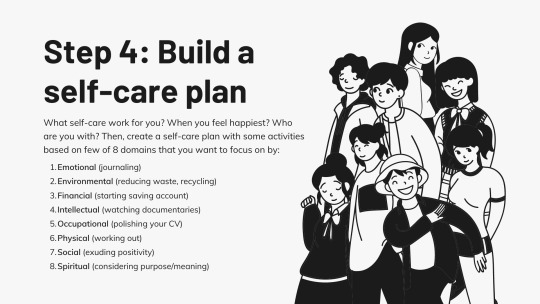

Last post for New Year Special! Through this series, I hope that we can all overcome our insecurities and take care of ourselves more during the next year! 💙 Self-care is not selfish, and you cannot spread the positivity to others when you are insecure about their performance. ❤️
5K notes
·
View notes
Photo


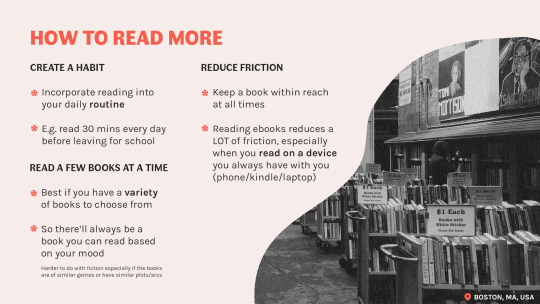
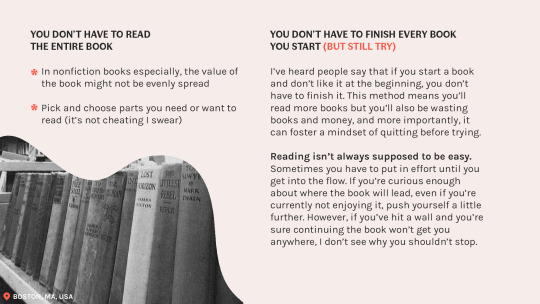
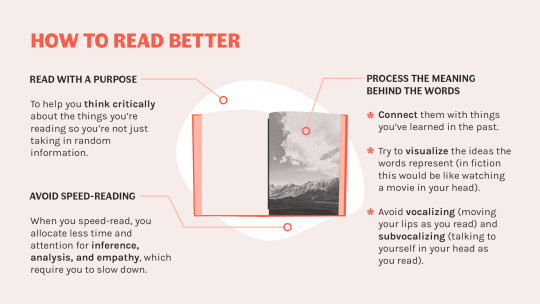
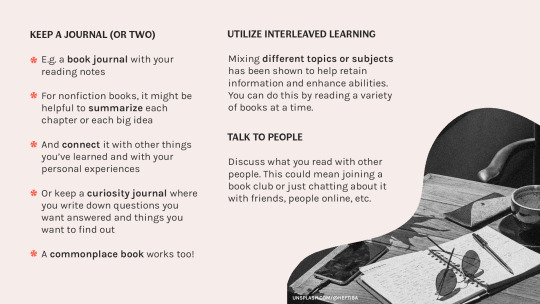
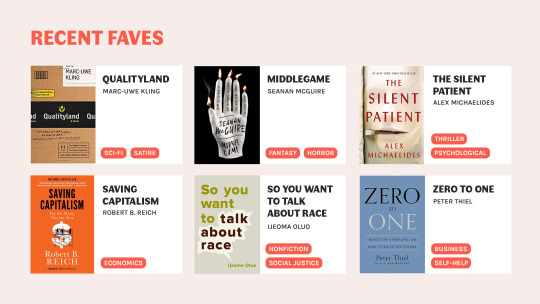

Read More, Read Better
Many of us are looking for more ways to enjoy our time at home in these stressful circumstances. Some of us have turned to books. But how can we make sure we get the most out of them?
Keep reading
24K notes
·
View notes
Text
FOR ALL MY FELLOW BROKE COLLEGE STUDENTS HERES A LIST OF A BUNCH OF PLACES YOU CAN FIND FREE PDF VERSIONS OF YOUR TEXTBOOKS.... IF YOU NEED ANY HELP FINDING A BOOK JUST SEND ME A MESSAGE AND I'LL DO MY BEST TO HELP
http://www.textbooknova.com/
http://www.freebookspot.es/
http://www.free-ebooks.net/
http://www.getfreeebooks.com/
http://textbookrevolution.org/index.php/Main_Page
http://en.bookfi.org/
http://www.epubbud.com
http://www.reddit.com/r/eebooks+mathbooks+csbooks+physicsbooks+econbooks/new/?sort=new
http://mobibookz.co
http://www.gutenberg.org
http://manybooks.net
http://people.math.gatech.edu/~cain/textbooks/onlinebooks.html
http://openlibrary.org
http://ebookee.org
http://oerconsortium.org/discipline-specific/
http://bookboon.com/en/textbooks-ebooks
http://www.booksshouldbefree.com/Top_100
www.readanybook.com/
32K notes
·
View notes
Photo

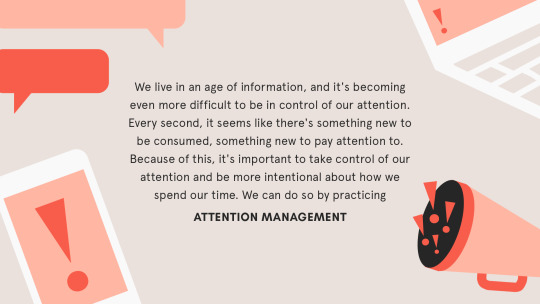

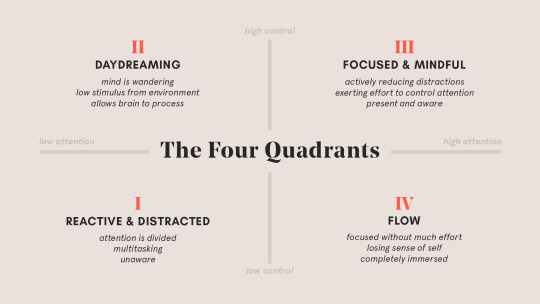
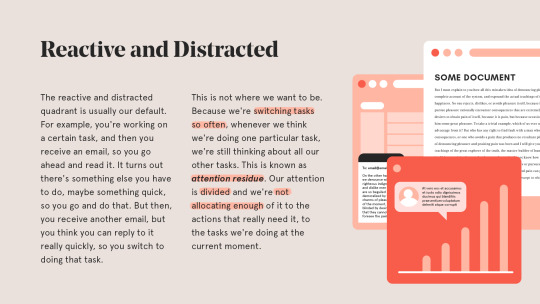
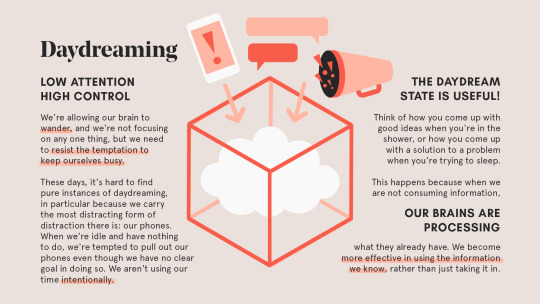
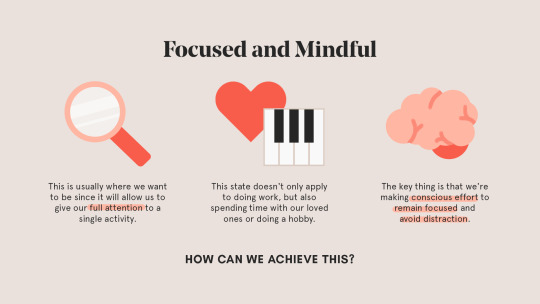

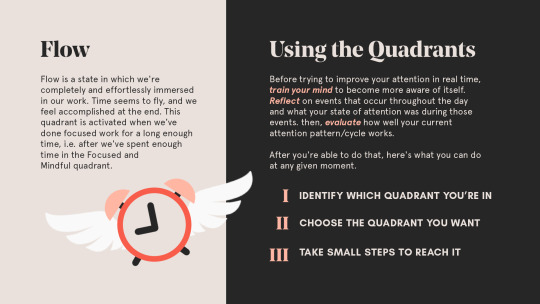
Attention Management: How to Take Control and Live Intentionally
We live in an age of information, and it’s becoming even more difficult to be in control of our attention. Every second, it seems like there’s something new to be consumed, something new to pay attention to. Because of this, it’s important to take control of our attention and more intentional about how we spend our time, and we can do so by practicing attention management.
Keep reading below for a transcription + some other posts you might be interested in:
Energy Management
Flexible Time Blocking
The Mandatory Midday Break
A Small Guide to Journaling
Staying Focused while Studying
Hope this helps!
Keep reading
8K notes
·
View notes









